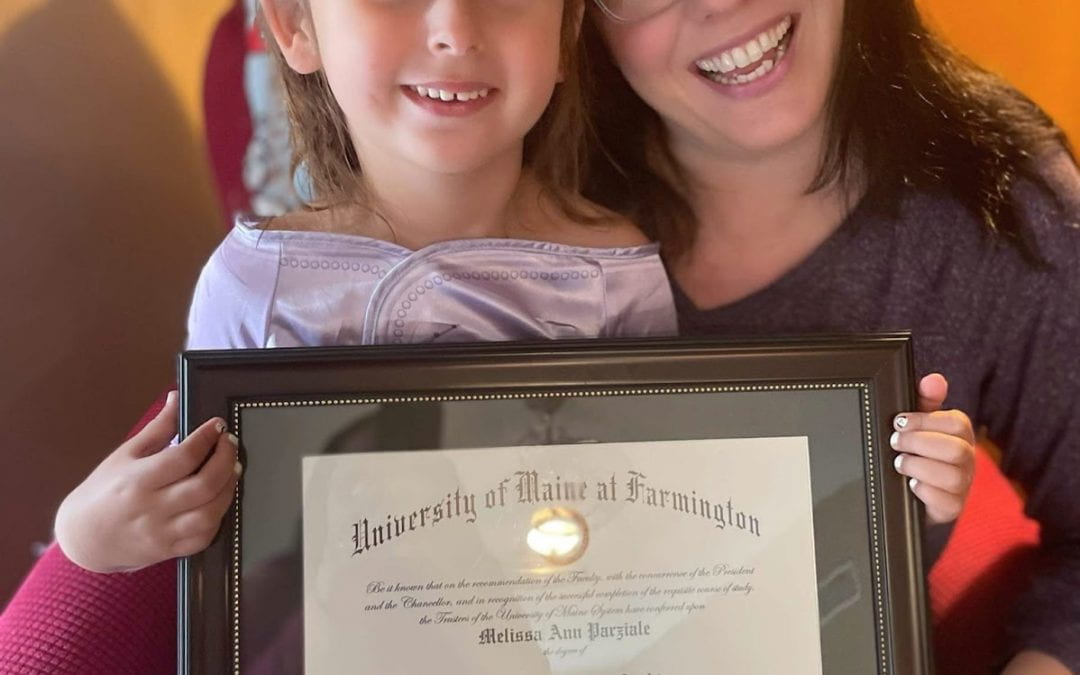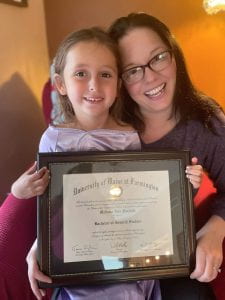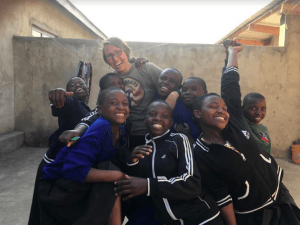
Dec 16, 2021 | Exclusive, Feature, News, TopStory |
By Charity Webster, contributing writer

(Photo Credit Melissa Pariziale) Melissa and her daughter Mia
Becoming an alumni is what every student wants, but often life throws curve balls at the student which changes the course of life and causes them not to complete the task. UMF has started an amazing opportunity for those students that have struggled to complete their degrees for one reason or another. A program called “Almost Alumni” helps these individuals finally finish their degrees.
Ashley Montgomery is the Assistant to the Dean, Learning and Assessment at UMF, and she is the driving force of Almost Alumni. She also chairs the academic success team which monitors and works with students who are struggling currently at UMF. These “Almost Alumni” individuals are having their transcripts reviewed. If it is possible to complete the degree they will support these individuals through the process.
In the beginning, when Montgomery was attending a meeting with others involved in upper-level education, she really had not put much thought into UMF having a large number of Almost Alumni or stop students (as they are called elsewhere). “Our numbers for adults (24+years old) is very minimal and the majority of the UMF population tends to be of a traditional age,” said Montgomery. Typically, more than half of a class finishes the degree in a normal college timeline. What happens to the rest of them? UMF has stepped up to find them and help support them through what is missing. They are committed to the success of the non-traditional student. They are even willing to pay fines and find resources to pay for books and other college expenses. “They will even research more local colleges for the student to make the transition and completion easier.” said Melissa Parziale, Graduate from Almost Alumni.
“Almost Alumni have delivered 20+ diplomas to students who never had the opportunity to finish their college degree over the last year, each time I was almost in tears from so much joy.” Montgomery said.
Montgomery has sifted through hundreds of past students and selected students that she is approaching to develop a plan to finish. When asked if there was financial support for these students, the answer was there are funds that can help Almost Alumni complete their projected course of study.
Melissa Parziale is one of those students who was approached by Montgomery and only needed two classes to graduate once they reviewed her transcripts and changed her major to General Education. “This phone call and opportunity came at the perfect moment in my life. During COVID, I had lost my job and I was training for Human Resource Management and Leadership, I was so shocked I was receiving an email saying I was close to finishing my Degree” said Parziale. Twenty-eight years after starting her degree at UMF, she finally finished her degree in July of 2021. She proudly hangs it on her wall in her office at a Dental Lab where she is the Director of Human Resources.
For some individuals, graduation is even easier than anticipated. “For some it might be just switching majors and immediately getting a diploma, and for others it might be just one class to completion” Montgomery said. There are a lot of students in the system who have a degree right now and don’t even know it, some just because they never applied for their diploma. Also, they may have been enrolled in the program a while back and the requirements have changed. “These are the easy diplomas,” said Montgomery.
“If I could tell everyone to go back and finish I would, it was what I always wanted to do and Ashley supported me through it every step of the way. Reach out to her and finish,” said Parziale. “I wanted my daughter to know that she can do anything and to never give up on your dreams.”
Contact Information: Almost Alumni Ashley Montgomery Assistant to the Dean, Learning and Assessment at UMF ashleym@maine.edu
Oct 10, 2021 | Exclusive, Feature, News |
By Paige Lusczyk, Contributing Writer.
The University of Maine at Farmington’s Art Gallery will be showcasing installation artist Samantha Jones’ work, “Vital Traces,” until Oct. 28. Last week, Jones spoke about her work at a public reception on Mantor Green.
“Vital Traces” is split up into three different sections, one for each floor of the gallery. Each floor connects to a different feeling of grief.
“There is a joy that comes from the body that the brain can’t handle,” Jones said. The pieces shown in “Vital Traces” and the materials used helped Jones step out of her body and be one with her grief, she said.
“There is no border for me between personal and art,” Jones said. “Our Ego is in the way of our ability to connect to the rest of the world… in the way of saving ourselves.”
The first floor holds many different styles of art ranging from glasswork to jewelry sculptures to digital aluminum prints. Jones likes to call the first floor “Area 51” or “Seance.” The work is all about reaching.
“It’s not human. It’s all types of being,” she said.
With her piece, “Seance with Malka,” Jones admitted to channeling her late grandmother-in-law to help her place each piece of jewelry. The jewelry itself was her grandmother-in-law’s and she felt even more connected to her as she placed each piece.
“She was a walking art piece,” Jones said, “I channeled her.”
One of the more curious display pieces of “Vital Traces” would be the breastmilk soap on the first floor. Jones saw the art as an excretion of the initial process. She connected a child to that process and actually used her own breast milk from nursing her son.
“The art that comes has its own life; it becomes its own. It then gets to teach me,” Jones said. “It is not doing it according to our bidding.”
The second floor is “where the pieces get to reach back.” As you walk up the stairs a beautiful piece is draped along the staircase that is full of life and conversation. The piece, “L’esprit de L’escalier,” was inspired by Diderot, an artist that talked about how we only think of good comebacks when we walk away from the situation. “When the earth starts to speak,” Jones said.
Pieces “Entanglement III” and “Seismic Dreams” are the largest pieces in “Vital Traces.” “Entanglement III” falls differently in every installation. It becomes one with the room.
“Seismic Dreams” was made with no plan. Jones worked in a way with the material so she would not interfere with how it wanted to form. The piece was not titled until Jones opened the folded cloth. “It was telling me what it was,” Jones said.
The third floor is more of a cathartic gesture. It holds only one piece titled “Immanence” which tries to capture the essence of topless churches in Rome. The piece brings a sense of “connecting the architecture to the atmosphere.”
Jones admitted that she sees the “materials [she] works with as living creatures.” Seeing her work as living beings helps the process be more organic for Jones. Although she did admit that “it’s terrifying not knowing where you’re going.”
However, Jones said her art is truly all about the process. Most of the work that she displayed in the gallery was made by trying to avoid a true plan and letting the art speak for itself.
“It is a way into care, it’s a way into reconnecting to things that we have subverted and ignored by trying to make a plan,” Jones said.
Gallery Director, Sarah Maline took the initiative to reach out to Jones. “I had been stalking her work online for a couple of years,” Maline said.
“Vital Traces” was postponed for another year after the initial acceptance because of the pandemic. “The whole show changed after that year. Right? Because you can’t have just…. something that you thought you had, then you’re in a different place, right? You gotta be where you’re at,” Jones said.
Recent UMF Alumna, Samantha Taylor, opened up for Jones in the public reception. Taylor performed by singing and playing songs on a guitar for a half hour.

Oct 10, 2019 | Sports |
Riley Bartell Contributing Writer
During the recent alumni baseball game at Hippach Field, UMF’s Derek Bowen capped off an afternoon of competitive camaraderie when he drove in the winning run in the bottom of the ninth inning. Bowen, who came to the plate with the bases loaded, hit a sacrifice fly to break a 6-6 tie in a tightly contested game, giving UMF the 7-6 victory over the alumni squad.
The alumni game’s atmosphere differs from regular season games, according to Christopher Bessey, UMF’s baseball coach, who enjoys the banter between his current squad and alumni players.

The UMF alumni game is a great opportunity for current baseball players to interact with Farmington’s past (Photo Courtesy of UMF Athletics)
“Both teams still play hard, but there’s a lot of laughter and a bit of joking around,” said Bessey, “It’s a great experience for both sides, and their competitiveness really comes out.”
“Current players get to see past players,” he added, “They want to compete when they get to be alumni. Then when they get to be alumni, they want to come back and compete.”
Since baseball is a spring sport, the alumni game is one of the highlights of the team’s short fall season. “Obviously the fall is evaluation time for us,” said Bessey. “It gets our guys into a competitive environment. You can see how they compete. The alumni, for the most part, are still in pretty good athletic shape so they can be good competition against us.”
Playing in his fourth alumni game, Gavin Arsenault, senior, always looks forward to that weekend. “It’s good to see all the previous players,” said Arsenault. “Even the players I didn’t play with, it’s nice to interact with them and see how their lives are going.”
The game generally draws a sizable crowd. “A lot of people show up, and it’s good for the first year players. It gets them some experience in game situations,” said Arsenault.
The alumni game is held on Family and Friends’ Weekend at UMF, so it always draws a good crowd. The alums were asked for donations for Captain Bell and the firefighters who were involved in the LEAP explosion as well as others who are homeless because of the explosion.
“The athletic department, including baseball, softball, lacrosse, soccer, and rugby teams, decided as a staff that we were going to accept donations,” said Bessey. “Four different organizations are raising money, not only for the firefighters, but also for those who are homeless because of the explosion.” In all, the athletic department raised over $900 that day.
After a close contest, the UMF baseball team ended up beating the alums in the bottom of the 9th, due to a walkoff hit.
Sep 26, 2019 | News |
Derek Taber, Contributing Writer
The Hotel Rumford in Rumford, ME is celebrating its 130-year anniversary and UMF alumni Melissa Carrier is at the helm of a growing economy for this small mountain town.
Carrier, who graduated from UMF in 2009, has owned and operated the historic hotel and bar with her husband, Brian, for the last year and a half. Carrier is changing the vision and atmosphere of the staple establishment, and leading the charge of a growing economy. Once considered a dying mill town, Rumford has seen lowered unemployment, and a rejuvenated workforce, allowing room for growth and opportunity in the emboldened community.
George O’Keefe, the director of economic development for the town of Rumford, was hired to stimulate business growth and inject new ideas for downtown businesses to reinvigorate that Rumford has ample room to thrive and succeed. “It’s very positive to see young people staying in town, and running a business,” O’Keefe says.
The Hotel Rumford has been one of the few businesses to survive the economic downturn of the last quarter century. A shrinking logging and paper industry has been the main culprit for the lost jobs in the area. At one point there were six paper machines operating, with over 1000 blue collar jobs available. When the mill struggles, “Everyone panics,” Carrier says.
The Hotel Rumford was a haven for loggers and paper workers, allowing a place for respite, and lift of spirit from the grueling work in the woods. “This is the heart of downtown Rumford,” says O’Keefe. The town rallies around the business and frequents the establishment often.
The hotel also brings in people from out of town who come to work on shutdowns and construction projects associated with the mill.
Carrier started her business education in her sophomore year of college. She worked in the community at the Granary Restaurant and Pub in Farmington, and summers at the Kawanhee Inn in Weld. Carrier and the future head chef of the Hotel Rumford, Scott Croteau, met when Carrier was a dishwasher at Kawanhee. “Scott is an amazing chef,” Carrier said.
Croteau prides himself on delivering a fresh menu with local ingredients. “He makes almost everything in house,” Carrier laments.
The Hotel Rumford has 12 employees that work at the restaurant. The economic outreach that comes from the employment is deep. “Everyone seems to know your name when you walk in to the bar,” O’Keefe says.
The Carriers recently did some remodeling to the hotel and restaurant to bring back the staple theme of logging to the town. They decorated the restaurant with antique saws and pictures from the town when horses and carriages roamed the streets.
The difference from now and 130 years ago is substantial. Recreation and vacation destinations rival the paper industry as the main catalyst for economic growth. The potential is prevalent. If people have a place to call home when they are in town, the sentiments will only grow stronger, and the future is vibrant.

Nov 26, 2018 | News |
By Emilee Eustis Staff Reporter

2016 Graduate Elizabeth Ferry made a strong connection with her students in Iringa (Photo courtesy of Elizabeth Ferry)
The Peace Corps is something everyone knows and hears about, but how many people get to say they did it? Elizabeth Ferry, a UMF graduate, embarked on a journey that not many will experience in their lifetime and is excited to be bringing the adventure home with her.
Ferry graduated from UMF in the year 2016 with a degree in Secondary Education and a concentration in English. “I expected to immediately jump into teaching at a local Maine high school, coach sports, and live a happy, contented life,” said Ferry. “The incredible UMF faculty and my student teaching mentor encouraged me to take a risk and apply for Peace Corps.”
That risk landed her in the Southern Highlands of Tanzania where she taught English to 9th through 12th graders. Ferry also implemented health education projects, cultural exchange activities and leadership development.
“Teaching in Tanzania was supremely different than teaching in the U.S.,” said Ferry. “However, the goal of being a confident, caring, competent educator while putting my students’ needs above all, is an international best practice.”
Beyond teaching, Ferry was entrenched in a world that not many American citizens understand. Living without indoor plumbing, electricity and varieties of foods could be horrendous to some, but enlightening and enriching to those experiencing it firsthand, and since returning home, Ferry has been sorting between the life she lived in the rolling hills to the life she is living now.
“I’ve been balancing guilt and gratitude,” said Ferry. “I am trying to acknowledge and appreciate the things I lived without, while also adjusting my priority list to things I need versus things I want.”
Since returning to the US, Ferry hopes to spread the word about the incredible opportunity that the Peace Corps gave her and encourage students to take the leap that she once took. “My favorite part about being back in the States is sharing my experience with American students,” said Ferry. “Their curiosity and eagerness to learn about a new place has given me goosebumps.”
Ferry’s teaching degree is being put to good use as she was lucky enough to land a part-time teaching job at Mt. Blue High School upon her arrival in Maine, and besides teaching three English classes a day, Ferry does Peace Corps school visits as much as she possibly can.
“It’s said that Peace Corps is ‘the hardest job you’ll ever love,’ and I think that is quite accurate,” said Ferry, thoughtfully. “Having the opportunity to organically live in another culture, work alongside its people, and learn what qualities make us all human, is invaluable.”
Ferry will be presenting on her time in the Peace Corps in the Fusion Space on December 4th at 6 p.m. and encourages all who can to come hear the retelling of her once in a lifetime experience. During the presentation students can expect to learn some Swahili – the language Ferry is now fluent in, try on some traditional Tanzanian clothing and look at breathtaking photos of the colorful landscape and wildlife that occupies the country.
As for those considering such an experience as hers, Ferry encourages students to just go for it. “Do it. Peace Corps has the best method and philosophy for foreign aid and I could not recommend it more,” she said. “I’ll never forget what I learned in Tanzania and I hope to continue to tell the stories for the rest of my life.”



